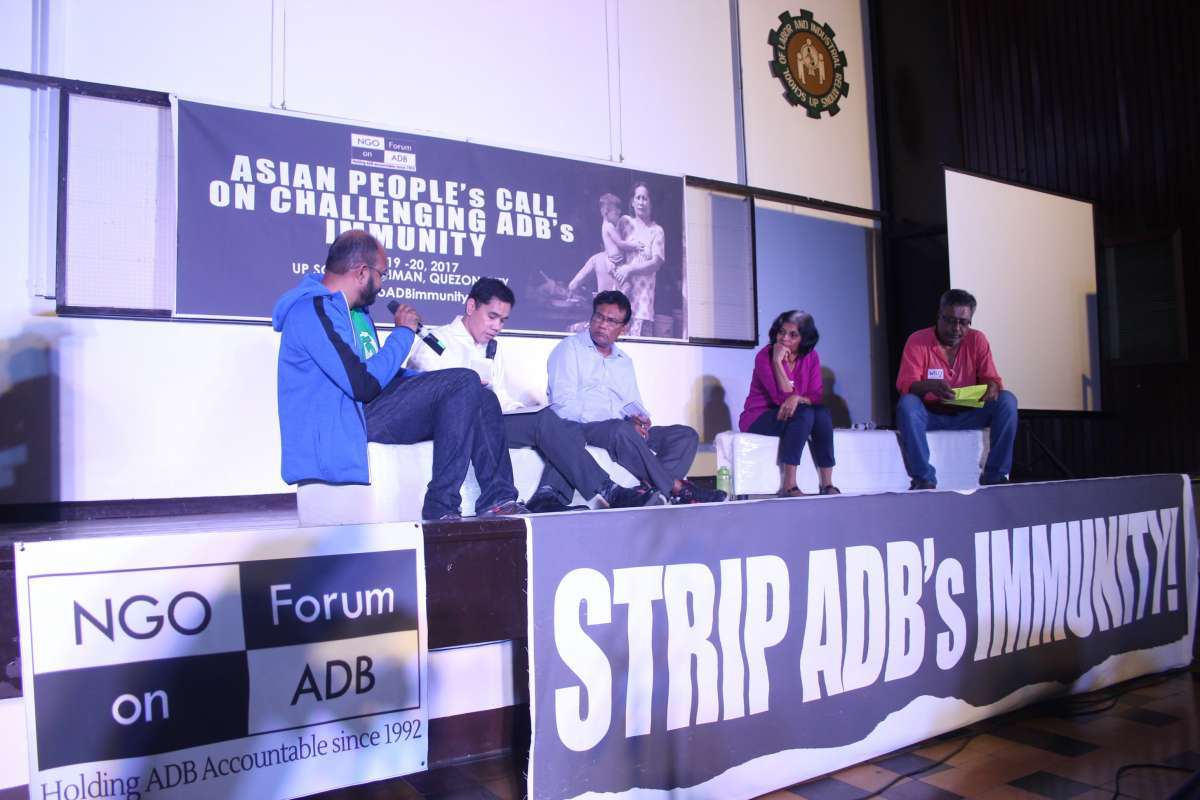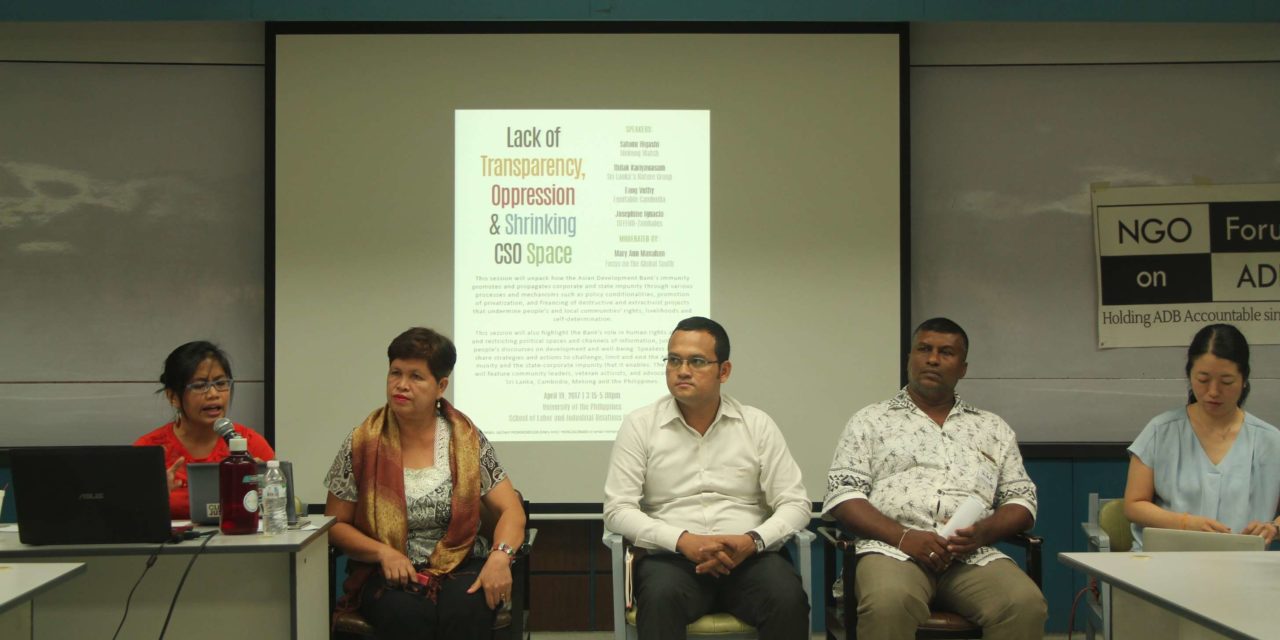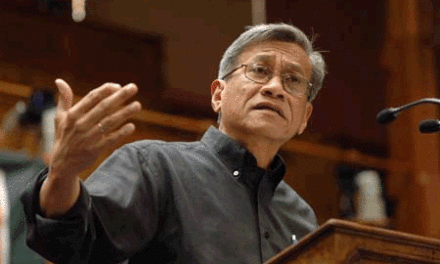Manila—FOCUS on the Global South led a thematic discussion on lack of transparency, increasing oppression, and shrinking of CSO space as part of the conference called “Asian Peoples’ Call on Challenging the ADB’s Immunity,” held April 19-20 at the University of the Philippines in Quezon City,
The session, participated in by around 30 participants, among them veteran ADB campaigners as well as youth leaders learning about ADB for the first time, aimed to unpack the issues and challenges confronting affected communities and campaigners resisting ADB policies and projects on the ground. It also sought to examine the ways by which ADB’s immunity promotes and propagates corporate and state impunity through various processes and mechanisms, and to identify ways to move forward through continuing campaigns and actions.
A distinguished panel representing affected communities as well as campaign organizations across the Asian region addressed the key objectives of the thematic discussion.
Thilak Kariyawasam from Sri Lanka’s Nature Group began the conversation by raising a fundamental issue hounding ADB projects—the lack of transparency and public participation. Several speakers also weighed in on this problem, citing specific instances where projects were implemented without the knowledge and consent of communities. In cases where consultations had been held, many of the groups opposing the projects were not represented and only the voices of those who support the projects were heard.
Thilak also criticized the ADB for its strong efforts to influence government’s position on specific projects, oftentimes to suit private sector demands, as well as its efforts to “mislead the public and sow divisions within the community by organizing so-called ‘allies’ within civil society supposedly supportive of its policies and projects.
For her part, Josephine Ignacio, who represented the local campaigns organization Defenders of the Environment for Genuine Development or DEFEND-Zambales, shared similar concerns over what she called as ‘false promises of the ADB” that the projects would benefit farming and fishing communities with more jobs, livelihoods, and free transportation and electricity. Ms. Ignacio and DEFEND-Zambales continue to lead the fight against the 630-megawatt Masinloc coal-fired thermal power plant, one of the largest base-load ‘clean-coal’ power plants in the Philippines and still pushing for further expansion of its operations.
DEFEND-Zambales has documented health and environmental cases, loss of livelihoods as well as problems of dislocation of affected communities and second-generation issues associated with resettlement and relocation.

ADB’s Culpability
A key point raised in the discussion is how the ADB has been able to evade all of these issues by hiding behind the wall of immunity since its inception in 1967. The ADB’s charter provides the institution a high degree of immunity from legal liabilities and accountability to national laws for problematic projects and faulty policy advise. The panelists articulated a litany of issues against the ADB for which the Bank should be held accountable. These included its continued support for projects that violate laws and its failure to ensure compliance to even out its own policies. Here a contradiction was pointed out, namely that while the ADB in many occasions has not hesitated to exercise its power and influence to change laws that favor its own commercial interest and those of the private sector, in other occasions it has feigned a lack of power to demand from governments strong enforcement of laws that would have favored the community and the environment, thereby washing its hands of violations and abuses committed by governments in the name of these projects.
ADB’s relations with authoritarian regimes was also highlighted and that this has borne out of the ADB’s own history of continued push for loans, financing projects by dictatorial governments, often despite clear issues of misuse of funds and corruption. In the name of protecting these massive investment projects financed by the ADB, governments across Asia have often resorted to force, leading to increased militarization in the countryside.
By continuing to push projects in countries where there have been documented cases of corruption and human rights violations, and furthermore, by not speaking out against these issues, ADB has in effect been condoning, supporting, and promoting these regimes.
The discussion on the intersection of government policies, corporate agenda, and the ADB’s own operations focused on the need to view ADB’s immunity within the context of a broader architecture of impunity where governments and the corporate private sector are allowed to violate laws, ignore peoples’ rights, violate peoples’ rights, and destroy the environment.
The Continuing Struggle
Eang Vuthy of Equitable Cambodia summed up what needed to be done moving forward. He elaborated on their own efforts to raise the peoples’ awareness on the negative impacts of ADB on development, and their commitment to continue to organize communities to resist policies and projects that undermine the peoples’ aspirations for a better life.
Exploring different ways of educating people through cultural forms, engaging in street actions and protests, lobbying with governments, and building and strengthening networks and movements would be some of the strategies that campaigners across Asia would use to challenge the ADB.
The campaigners also stressed the importance of sustaining documentation
and sharing of stories and struggles of affected communities, as well as research and analysis to expose the gaps between what these projects have promised and the realities on the ground.
For many countries across Asia, the campaigns against ADB policies and projects go back decades. The campaigners, thus, highlighted the importance of re-telling stories of affected communities for the youth to understand and appreciate the long history of peoples’ struggles against the Bank.
The participants also vowed to step up the efforts to link up and find convergences with other campaign and strengthen international solidarity for broader systemic changes and alternatives, such as the overhaul of economic policies.
Another area of work that has been slowly gaining ground is the legal recourse that has already been explored by some campaigns, through the filing of legal cases in the International Court of Justice. There was a strong assertion from the group that in the wake of shrinking spaces for peoples’ participation and instituting public policy across Asia, peoples and communities should continue to find ways to open up new spaces and expand previous platforms or avenues. The use of social media was also cited as a powerful tool to put messages across to a broader audience.
Overall, the session underscored the urgency to create and foster alternative models of development and development financing, which would promote people’s rights, protects livelihoods and the environment, and expand spaces for democratic participation of the people, especially the marginalized and the poor so that they can exercise a greater measure of influence on governments. This means keeping in check and shrinking the power of public and multilateral institutions such as the ADB.








